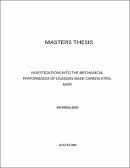| dc.description.abstract | Carbon steel bars are one of the most used steel products in structural constructions worldwide. Ugandan steels have been reported to have significant amounts of residual elements due to use of scrap steel in their production. Variations in carbon content have been reported in the Ugandan made reinforcing steel bars made from scrap raw material indicating a lack of chemical composition control. Therefore, to ascertain the compliance with quality standards, this study investigated the mechanical performance of Ugandan made carbon steels bars (20mm TMT ribbed bars) focusing on chemical composition, microstructure, tensile strength, and bendability. A comparison of the results with the requirements of the quality standards BS 4445: 2005 and the East African standard, EAS 412 - 1: 2005, based on ISO 6935 were used to establish the performance of the Ugandan made steel bars. Three (3) steel producing companies were considered based on their annual production capacity. In order not to identify the steel companies chosen, the companies were coded as A, B and C. A total of nine (9) steel bars of 20mm diameter were used in experiments. Three (3) bars were picked from the distributors of each of the steel producers selected. A spark emission spectrometry was used for chemical composition analysis, photo Microscopy of x500 was used for microstructure analysis and a universal tensile testing machine was used for both tensile strength and bendability tests. The carbon equivalent value (CEV) ranged between 0.363% and 0.374% for company A, 0.307% to 0.323% for company B and company C between 0.347% and 0.397% which are within acceptable range according to BS 4445: 2005 standards ranging 0.3 to 0.55%. There were variations in the microstructures of steel bars. The tensile strength (UTS) alternated between 640N/mm2 and 714N/mm2, the yield strength (YS) extended between 538N/mm2 and 600N/mm2, UTS/YS ratio was between 1.252 and 1.195 and the percentage elongation 18% to 22%. The values were all within the acceptable range according to BS 4445:2005 standards. The maximum bending force needed to bend to 900 was found to be 52235N with a maximum deflection of 74.4mm. The Steel bars exhibited bending stress with a range of 148 N/mm2 to 166 N/mm2. The general mechanical performance of the 20mm steel bar had acceptable quality standards basing on BS 4445: 2005 and the East African standard, EAS 412 - 1: 2005, based on ISO 6935 but with variations in carbon equivalent values.
Key words: carbon steel bars, chemical composition, microstructures, tensile strength and bendability | en_US |

